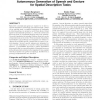170 search results - page 33 / 34 » Cognitive Social Simulation Incorporating Cognitive Architec... |
PPL
2007
13 years 5 months ago
2007
The traditional computational devices and models, such as the von Neumann architecture or the Turing machine, are strongly influenced by concepts of central control and perfectio...
ATAL
2008
Springer
13 years 7 months ago
2008
Springer
Humans continuously assess one another's situational context, modify their own affective state, and then respond based on these outcomes through empathetic expression. Virtua...
ECAI
2006
Springer
13 years 9 months ago
2006
Springer
This work presents some anticipatory mechanisms in an agent architecture, modeling affective behaviours as effects of surprise. Through experiment discussion, the advantages of bec...
APGV
2010
ACM
13 years 9 months ago
2010
ACM
Spatial awareness is crucial for human performance efficiency of any task that entails perception of space. Memory of spaces is an imperfect reflection of the cognitive activity (...
ATAL
2009
Springer
14 years 9 days ago
2009
Springer
Embodied conversational agents are required to be able to express themselves convincingly and autonomously. Based on an empirial study on spatial descriptions of landmarks in dire...



